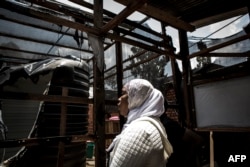Armed assailants on Saturday attacked an Ebola treatment center in the Democratic Republic of the Congo less than a week after it reopened following a previous attack.
The attack in Butembo came in the early-morning hours and left one police officer dead and several workers injured.
Butembo Mayor Sylvain Kanyamanda told reporters that security forces had defended the center and wounded one of the attackers.
World Health Organization Director-General Tedros Adhanom Ghebreyesus visited the center several hours later and encouraged health care workers to continue fighting the deadly Ebola virus.
"It breaks my heart to think of the health workers injured and police officer who died in today's attack, as we continue to mourn those who died in previous attacks while defending the right to health," Ghebreyesus told reporters. "We have no choice except to continue serving the people here, who are among the most vulnerable in the world."
After the previous attack on the Butembo center, Doctors Without Borders suspended its operations in the city.
Precautions stir doubts
Anti-Ebola efforts already have faced adversity from residents suspicious of the extensive precautions taken by the health care workers to stop the spread of the highly contagious disease. Because Ebola virus can be transmitted through a victim's bodily fluids even after death, even burial of the victims requires stringent safety protocols.
Thursday, Doctors Without Borders President Joanne Liu said the containment efforts used to control the latest outbreak of Ebola, which started in August last year, faced a "climate of deepening community mistrust" that was worsened by the use of security guards at treatment centers.
Congo's health ministry has warned the attacks in Butembo and on another treatment center in Katwa last month can lead to a "significant upsurge" in new Ebola cases.
More than 86 percent of the confirmed cases over the past three weeks came from Butembo and Katwa, according to the health ministry.
The current outbreak is considered the worst since the two-year outbreak in West Africa that started in 2014 and killed more than 11,000 people.






